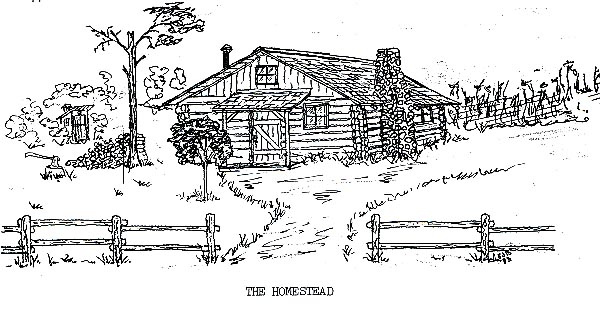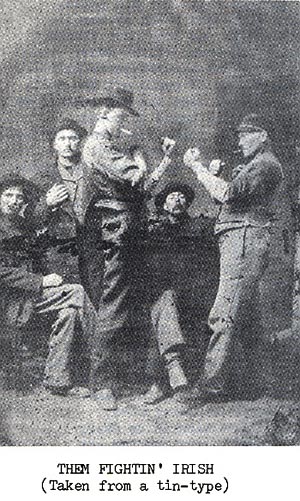|

On December 28, 1864, James
Getty bought for 5 dollars from Simeon
Davidson, 40 acres in Section 36, the NEt of
the swt. He built a log cabin not too far from
the road on the site where the Leland Downing
residence is now located. And he planted a pear
tree right in front of the cabin (Gleckley Sweet
Pears). The trunk of the tree still stands
today. Several feet northeast of the cabin he
dug a well.

James, Mattie, and the
children worked hard to clear the land and drain
the swamp, and to make enough money to pay for
it. They were blessed with prosperity, and
within a few years purchased land just across
the County Line in Monroe County. At one time
James owned one half section in Milan Township
and one half section in
Dundee Township, right
where the corners of the townships meet at the
Lenawee Monroe County Line. It appears that he
bought all this land with the intention of
setting up his boys in farming. He sold each of
them eighty acres. Not one of them kept the land
very long.
James and Matilda's lives
were not without tragedy. Their oldest son,
William, had enlisted in the army in 1861.
Alexander, as is the case with most young boys,
had a great admiration for Will, and vowed that
as soon as he was 18 he would join up, too.
There was no talking him out of it; he was
determined he was going to fight for his new
country. James signed the "Consent In Case Of Minor" form, against his
better judgment. Alex enlisted on the 19th of
March, 1864. He gave his occupation as
blacksmith. He had gone to work for a local
smithy as soon as he was big enough and had
learned the trade. Sadly enough, Alex had only a
few months in which to "do his patriotic duty".
He died of meningitis in Alabama in a regimental
hospital on November 5, 1864.
On October 30, 1870, James
and Mattie lost their son, Hugh, to the ravages
of consumption. Hugh was only 21, recently
married, and had in turn lost his son just a
month before. They say it was the swamp that did
it. The old timers claimed all this land around
here was swamp when it was first settled. That's
why so many people died with consumption,
especially young folks.
A year later almost to the
day, on October 27, 1871, Mattie died. She was
only 58. On her death record it says cause of
death "chronic". James found it hard to cope
after Mattie's death. She had been his love, his
helpmate, the mainstay of his life. But life
goes on.
 The Irish were dreamers.
They always wanted something they didn't have.
In Ireland most of them didn't have land, so
when they came to this country, that was what
they wanted land! Some of them were drunks and
drifters; but most were of good character and
charitable nature. The Irish were dreamers.
They always wanted something they didn't have.
In Ireland most of them didn't have land, so
when they came to this country, that was what
they wanted land! Some of them were drunks and
drifters; but most were of good character and
charitable nature.
James was a dreamer; a
kind, generous, sensitive person. But he was
also a shrewd businessman and a good farmer,
blessed with intelligence and plenty of
foresight and ambition. The above poem is
further proof that he had a better education
than most men of his time.
It had been heartrending
to pull up stakes and leave his beautiful
Ireland, but he couldn't tolerate the tyranny of
the English, and the starvation and deprivation
around him. So he and his family had come to
America for a fresh start. The new country had
been good to him and his family and they were
enjoying prosperity which would never have been
possible in Ireland. However, just a little more
than a month after James wrote the above poem,
his precious Mattie passed away.
The following spring, March
12, 1872, James married a lady by the name of
Rosa, who was born August 4, 1851). Perhaps he
took the step too soon, for this marriage was
nothing but turmoil. Little did he realize how
hard it was to replace his beloved Mattie. He
sued for divorce in 1875.
On December 17, 1877 he
waited two years this time he married a 49 year
old Catholic widow from Deerfield. Her name was
Anne Plunket, born in 1828. Anne had a son,
Patrick, who was born in Ohio August 25, 1862.
He died on February 24, 1886, when he was only
24 years old. This marriage to Anne apparently
turned out better and James appeared to be
content. George took over the homestead and
James and Anne moved to her home in Deerfield
Township.
The last poem that James
wrote was one to his grandchildren in Kalkaska,
to Will's two oldest children, George and Rena.
It was enclosed in a letter to William.
Apparently he was hoping to apply for a pension
or bounty, money due from the government because
of Alexander's death in the Civil War. He asks
for instructions from Will, who also served in
the Civil War. James was in failing health, and
he apologizes for his poor writing, however, I
have the original letter which was received by
William, and it is in excellent shape and very
legible. The only thing which makes it difficult
to read is that the ink has blurred somewhat.
The letter and poem follow.
 |
|
Deerfield April 1880
My Dear William John
I have received from
Washington blanks for testimony in regard of
pension Likewise for arrears of pay or bounty If
you are sure of what was Alexander’s due by the
government when he died please let me know
immediately If you are not sure perhaps better
to let the claim for bounty & back pay go If it
is not possible for you to be here please write
what ever instructions you deem useful Testimony
must be before the County Clerk I would suppose
I can get proof in the City of Adrian If it is
not convenient for you to come to see us please
write soon and let me know whatever you deem
necessary in the matter
My health is much as usual
cannot walk much now Anne has got a bad cold and
is not very well she would like to see you very
much
My dear grandchildren I am
glad to have a letter from your hand. I
anticipate every letter I receive from you will
be marked by improvement. Still remember it is
by learning to write well that we learn to write
fast and not by learning to write fast that we
learn to write well. Another maxim is sit down
to write what you think and not to think what
you will write.
My Dear Young Friends I
used to think I could write but I am so nervous
now I can make but a poor hand Please do write
often and I will try to answer your letters
give our love to Father Mother sisters and
brothers and all others
Deerfield April 3rd 1880
Jas & Anne Getty
Please let me know where
Alex enlisted
|
|
 |
This may have been the last
item that James Getty wrote. He died less than
seven months later.
On November 23, 1880, James
had a fatal heart attack at his home in
Deerfield. He, Matilda, Hugh, and Hugh's baby
are buried on the same lot in the front part of
the north half of Ridgeway Cemetery.
Following is his obituary
as it appeared in the Tecumseh Herald:

"James Getty, an old
resident of Ridgeway, died Tuesday night, Nov.
23. He was born in the county
of Antrim, Ireland, June 19th 1810, and was 70
years, 5 months and 4 days of age. He came to
America in 1851, and settled in New York State,
and removed to Michigan in 1854, and settled in
Ridgeway on Sec. 36, where he cleared up a farm
of eighty acres and lived until about three
years ago, when he married his third wife, a
widow living in Deerfield township, where he has
since resided. Shortly after retiring for the
night he complained of being cold, and being
distressed in his stomach. His wife arose, and
while kindling the fire, he got up, sat down on
a chair complaining of dizziness in the head,
and in a few moments fell to the floor dead."

Oh! youth, happy youth!
what a blessing!
In thy freshness of dawn
and of dew;
When Hope the young heart is
caressing,
And our griefs are but
light and but few;
Yet in life, as it swiftly
flies o'er us, Some musing for sadness we find;
In youth we’ve our troubles
before us,
In age we leave pleasure behind.
The above verse was taken
from a very old book which belonged to William
John Getty. It was titled The Songs Of Ireland,
by Samuel Lover, dated January, 1860. The
inscription on the fly leaf was: Corpl William J Getty Co B 6th
Mich
No doubt this was a book
that Will had while he was in the army in the
Civil War.

It has been nearly 175
years since James was born; 104 years since he
died. The years fly by and how
soon our pioneers are forgotten. James left us a
wonderful heritage the beautiful poems he
wrote, old letters, documents, pictures and
other artifacts, and plenty of Irish spirit and
ambition. The following was taken from an old
book which belonged to Addie Baird, William's
second wife. It was dated 1862.
The way was long, the wind
was cold
The Minstrel was infirm and old;
His withered cheek, and
tresses gray,
Seemed to have known a better day.
From The LAY OF THE LAST
MINSTREL
By Sir Walter Scott 1827
|